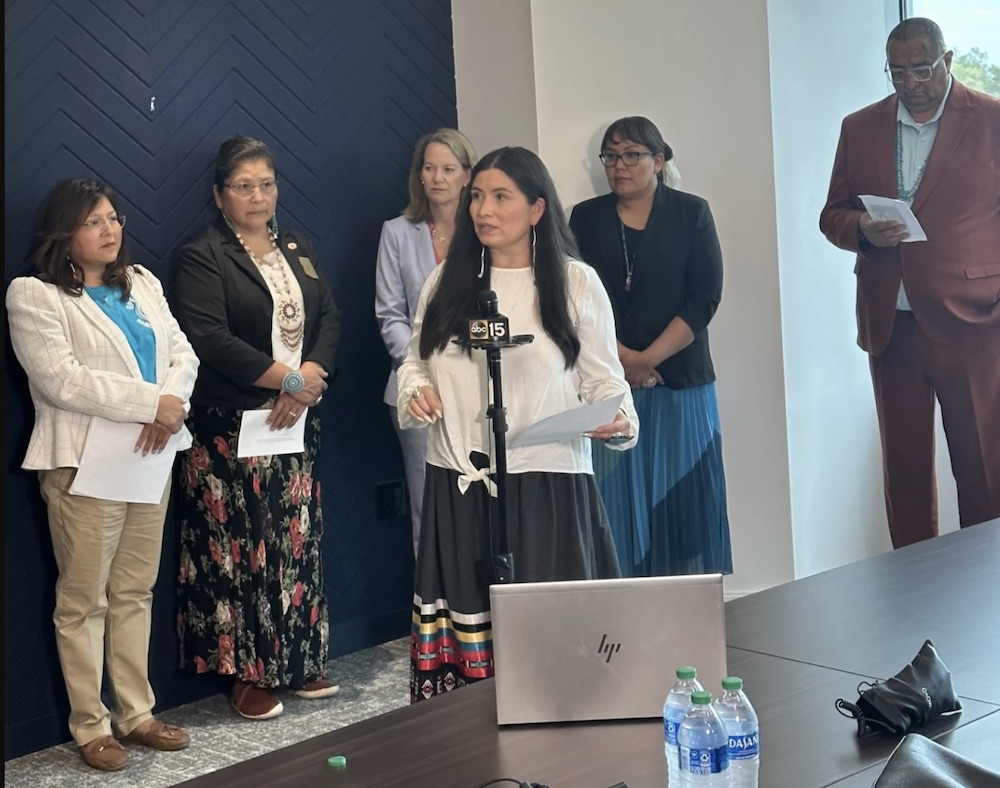
- Details
- By Darren Thompson
PHOENIX—Navajo Nation launched a new initiative to help its citizens caught up in a Medicaid scheme involving behavioral health centers that targeted Native Americans.
Tribal officials joined with Arizona Attorney General Kris Mayes at a press conference last Friday to announce Operation Rainbow Bridge, a command center focused on helping Navajo Nation citizens return to their families or to be placed in a behavioral health center that is in good standing.
The move follows an announcement last week of an investigation into allegations of widespread fraud in the state’s Medicaid program by operators of residential treatment centers — often referred to as sober-living facilities. Hundreds of millions of dollars are believed to have been fraudulently taken from the state’s Medicaid program when so-called “bad actors” targeted droves of Native American people, enrolling them in the state’s American Indian Health Plan (AIHP), leaving them untreated and giving them drugs and alcohol.
“We want to make sure our tribal members are safely transitioned from the facilities that were participating in fraudulent billing,” Navajo Nation Attorney General Ethel Branch said. “We want to create a safety bridge.”
In Navajo culture, a rainbow is used to indicate movement from place to place, Branch said as she explained the launch of the emergency operation. Organizers wanted to reflect cultural values in their response to what some are calling a humanitarian crisis, where it has been reported that more 1,000 Navajo citizens are victims of behavioral health fraud.
Last week, Arizona Gov. Katie Hobbs announced suspensions of more than 100 treatment centers in the Phoenix metropolitan area. Hobbs also announced that the Arizona Health Care Cost Containment System (AHCCCS) suspended payments to the same listed providers and said she has authorized a full third-party audit of all AHCCCS claims dating back to 2019.
Speaking on Friday at the press conference, Attorney General Mayes said the state and tribe were working together to solve the “humanitarian crisis” created by the situation.
“This response to the humanitarian crisis is critical to ensuring that members of the Navajo Nation can safely transition to a legitimate rehabilitation program or return home to their families,” Mayes said. “We are taking aggressive actions to stop fraudulent Medicaid billing practices by scam artists and criminals masquerading as legitimate health care providers.”
Mayes announced that state and federal officials have been investigating, indicting and pursuing financial remedies against individuals and companies to disrupt widespread billing schemes.
“It has been a game of ‘whack-a-mole’ because of the inability, or unwillingness, of the previous administration under former Governor Doug Ducey to address the structural vulnerabilities inherent in the fee-for-service billing model of the American Indian Health Plan,” Mayes said.
The state announced it has indicted more than 45 people and over $75 million has been seized or recovered, but the human impact is more difficult to measure.
“What has happened over the last three years, what this state has allowed to happen, is unconscionable,” Mayes said. “As Attorney General, I believe our Tribal Nations are owed an apology—I am sorry this happened.”
More Stories Like This
Two Feathers Native American Family Services Wins 2026 Irvine Leadership AwardBill Would Give Federal Marshals Authority to Help Tribes Find Missing Children
Indian Health Service to Phase Out Mercury-Containing Dental Amalgam by 2027
End of Enhanced Obamacare Subsidies Puts Tribal Health Lifeline at Risk
Santa Ynez Tribal Health Clinic to Host Free Pediatric Dental Clinic

